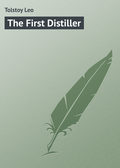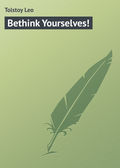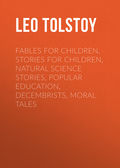
Лев Толстой
Tolstoi for the young. Select tales from Tolstoi
III
Thus Jilin and his comrade lived for a month. Their master was always cheerful. “You, good fellow, Ivan! I, Abdul, good fellow, too!” But he fed them badly. All the food they got was some unleavened bread of millet flour, or millet cakes, and sometimes nothing but raw dough.
Kostilin sent another letter home and did nothing but mope and wait for the money to arrive. He would sit in the barn day after day, either counting the days for the letter to come or sleeping. Jilin knew that his letter would not reach home, but he never wrote another.
“Where on earth could mother get so much money from?” he thought. “She lived mostly on what I used to send her, and if she has to procure five hundred roubles she’ll be quite ruined. With God’s help I’ll get away myself.”
So he kept his eyes open, planning how to run away.
He would walk about the village whistling, or doing something with his hands, such as modelling dolls out of clay, or plaiting baskets out of twigs. Jilin was very clever with his hands.
One day he modelled a doll with a nose, arms and legs and in a Tartar shirt, and he put this doll on the roof of the shed. The Tartar girls went to fetch water. The master’s daughter Dina caught sight of the doll, and called to the others. They put down their pitchers and looked up laughing. Jilin took down the doll and held it out to them. They laughed, but dared not take it. He left the doll and went into the shed to see what would happen.
Dina ran up, looked about her, snatched up the doll and ran off with it.
The following morning, at daybreak, Dina came out on the threshold with the doll. She had bedecked it in bits of red stuff, and was rocking it to and fro like a baby and singing a lullaby. An old woman came out and began to scold her. She snatched the doll away from the child and broke it, and sent Dina off to her work.
Jilin made another doll – a better one this time – and gave it to Dina.
One day Dina brought Jilin a jug, and sitting down, she looked up at him, laughing and pointing to the jug.
“What is she so pleased about?” Jilin thought. He took up the jug to have a drink, thinking it was full of water, but it turned out to be milk. “How nice!” he said, and finished it. Dina was overjoyed.
“Nice, nice, Ivan!” She jumped up and clapped her hands in glee, then she seized the jug and ran away.
After that she brought Jilin milk in secret every day. When the Tartar women used to make cheese cakes out of goat’s milk, which they baked on the roof, she would steal some and bring them to him. Once the master killed a sheep, and Dina brought Jilin a piece of the flesh hidden in her sleeve. She would throw the things down and run away.
One day there was a terrible storm; the rain poured down in torrents for a whole hour. The rivers became turbid. At the ford, the water rose till it was seven feet high and the current was so strong that it moved the stones along. Rivulets flowed everywhere and there was a roar in the hills. After the storm streams flowed down the village everywhere. Jilin asked his master for a knife, and with it he shaped a small cylinder and made a wheel out of a piece of board, to which he fixed two dolls, one on each side. The little girls brought him some bits of stuff with which he dressed the dolls – one as a peasant, the other as a peasant woman. He made them fast and set the wheel so that the stream should work it. When the wheel began to whirl the dolls danced.
The whole village gathered round – boys and girls and women and men came to look on, the latter clacking their tongues.
“Ah, Russ! Ah, Ivan!” they said.
Abdul had a Russian watch which was broken. He called Jilin and showed it to him. Jilin said, “Give it to me and I’ll mend it.”
He took it to pieces with the knife, sorted the pieces out, put them together again and the watch went quite well.
The master was pleased and presented him with one of his old tunics, all in holes. Jilin had to take it, besides, it would come in useful to cover up with at night.
From that day Jilin’s fame as a man skilled in handiworks spread fast. People began to flock to him from distant villages, one bringing the lock of a rifle or a pistol that wanted mending; another a watch or a clock. The master gave him some tools – pincers, gimlets and a file.
One day a Tartar fell ill, and they came to Jilin, saying, “Come and heal him.” Jilin did not know how to heal the sick, but he went just the same thinking, “The man will recover of his own accord.” He disappeared into the shed and mixed up some sand and water. In the presence of the Tartars he mumbled some words over the mixture, and gave it to the sick man to drink. Fortunately the Tartar got well.
Jilin began to understand a little of their tongue. Some of the Tartars got quite used to him, and when they wanted him would call “Ivan, Ivan!” Others again looked at him askance as at some wild beast.
The red-bearded Tartar did not like Jilin. He frowned when he saw him, and either turned away or cursed. There was another old man, who did not live in the village, but somewhere at the foot of a hill. He came to the village only sometimes. Jilin saw him when the man went to the Mosque to say his prayers. He was short and had a white towel wound round his cap. His beard and moustaches were clipped and white as down; his face was wrinkled and brick-red. He had a hooked nose like a hawk’s, and cruel grey eyes. He had no teeth, but two tusks in front. He would pass with his turban on his head, leaning on his staff, and peering round like a wolf. When he saw Jilin he snorted and turned away.
One day Jilin went to the hills to find out where the old man lived. He strolled down a path and saw a little garden and a stone wall; within the stone wall were wild cherry trees and peaches and a hut with a flat roof. He came a little closer and saw some hives made of plaited straw and humming bees flying hither and thither. The old man was on his knees, doing something to the hives. Jilin stood on tiptoe in order to get a better view; his shackles rattled. The old man turned and gave a yell and pulling a pistol out of his belt he aimed at Jilin, who just managed to shield himself behind the stone wall.
The old man came to the master to complain. The master summoned Jilin and laughing, asked him, “Why did you go to the old man’s place?”
“I didn’t mean to do him any harm,” he said. “I only wanted to see how he lived.”
The master conveyed his words to the old man.
But the old man was angry. He jabbered away, showing his tusks, and shook his fists menacingly at Jilin.
Jilin could not understand all he said, but he gathered that the old man was warning the master not to keep any Russians about the place, but to have them all killed.
The old man went away.
Jilin asked the master who the old man was, and the master said, “He is a great man! He was the bravest of us all, and killed many Russians, and he was rich, too. He had three wives and eight sons, who all lived in the same village. The Russians came, destroyed the village, and killed seven of his sons. One son only remained, and he surrendered to the Russians. The old man followed them, and also gave himself up. He lived with the Russians for three months, when he found his son. With his own hand he killed him and escaped. After that he gave up fighting. He went to Mecca to pray to God; that is why he wears a turban. Any man who has been to Mecca is called a Hadji and has to wear a turban. He does not like you Russians. He wanted me to kill you, but I can’t kill you because I paid money for you. Besides, I have taken a fancy to you, Ivan; I would not let you go at all, if I had not given my word.” He laughed and added in Russian, “You are a good fellow, Ivan, and I, Abdul, am a good fellow too.”
IV
Jilin lived in this way for a month. During the day he wandered about the village or busied himself with some handicraft, and at night he dug in his shed. The digging was difficult because of the stones, but he worked away at them with his file and at last made a hole beneath the wall big enough to crawl through. “If only I knew the neighbourhood well and which way to turn,” he thought; “the Tartars would not tell me.”
He chose a day when the master was away, left the village after dinner and went up a hill, hoping to find out the lie of the land from there. But before the master departed he told one of his boys to look after Jilin and not let him out of his sight. The boy ran after Jilin, crying, “Don’t go away! My father told you not to! I’ll call for help!”
Jilin tried to soothe him.
“I’m not going far,” he said. “I only want to go to the top of that hill to find a certain herb with which to cure your people when they are sick. Come with me; I can’t run away with the shackles on my feet. I’ll make you a bow and some arrows to-morrow.”
After some persuasion the boy went with him. The hill did not seem very far off, but it was difficult to get there shackled as he was. He struggled and struggled until he got to the top. Jilin sat down and began to look about him. To the south, beyond the shed, a herd of horses could be seen in a valley, and at the bottom of the valley was another village. Beyond the village was a steep hill and another hill beyond that. Between the two hills was a dark patch that looked like a wood; hill upon hill rose beyond it, and higher than all rose the snow-capped mountains as white as sugar, the peak of one standing out above the rest. To the east and west were other such hills; here and there were villages in the valleys from which the smoke curled up. “This is all Tartar country,” he thought. He looked in the direction of Russia – below was a river, and the village he lived in, surrounded by gardens. On the river bank, looking as tiny as dolls, sat Tartar women, washing clothes. Beyond the village was a hill, lower than the one to the south and beyond that two wooded hills. Between these two hills was a plain and away in the distance on this plain smoke seemed to rise. Jilin tried to recollect where the sun rose and set when he lived in the fort. He came to the conclusion that the fortress must lie in that very valley. Between these two hills would he have to make his way when he escaped.
The sun began to set. The snow-clad mountains turned from white to red; the dark mountains grew darker still; a vapour rose from the valley, and the plain where he supposed the fortress to be seemed on fire with the sunset’s glow. Jilin gazed intently; something seemed to quiver in that plain, like smoke rising from a chimney, and Jilin felt sure that the Russian fortress was there.
It was getting late. The Mullah’s cry was heard. The flocks and herds were driven home; the cows were lowing. The boy kept on begging “Come home,” but Jilin had no desire to move.
They returned home. “Now that I know the place I must lose no time in running away,” Jilin thought. He wanted to escape that very night, for the nights were dark then; the moon had waned, but as luck would have it, the Tartars returned that evening. Sometimes when they brought cattle home they would come back in a jolly mood, but this time there were no cattle, and on the saddle of his horse they brought back the red-bearded Tartar’s brother who had been killed. They returned in a gloomy mood and gathered the village together for the burial. Jilin, too, came out to look on. They wrapped the body in a sheet and without a coffin carried it out and laid it on the grass beneath some plane-trees. The Mullah arrived and the old men; they wrapped towels around their caps, took off their shoes, and squatted down on their heels before the body. In front was the Mullah, behind him three old men in turbans, and behind them three other Tartars. They sat silent, eyes downcast, for a long time, then the Mullah raised his head and said, “Allah!” (meaning God). After this word he again bowed his head, and there was another long silence. They all sat motionless. Again the Mullah raised his head and said “Allah!” All repeated “Allah!” and again there was silence. The dead man lay on the grass motionless and the others, too, seemed dead. Not a single man moved. The only sound to be heard was the rustling of the leaves on the plane-trees. After a while the Mullah said a prayer; all rose, and raising the dead man with their hands they carried him away. They brought him to a pit. It was not an ordinary pit, but hollowed out under the ground like a vault. They lifted the dead man under the arms, bent him into a sitting posture and let him down into the pit, gently, his hands folded in front of him.
The master’s servant brought some green rushes which they stuffed into the pit, then they hastily covered it with earth, levelled the ground properly and placed a stone, upright, at the head of the grave. They stamped down the soil and once more sat down round the grave side by side. For a long time they were silent.
“Allah! Allah!” they sighed and rose.
The red-bearded Tartar gave some money to the old men, then he took a whip, struck himself three times on the forehead and went home.
In the morning Jilin saw the red-bearded Tartar leading a mare out of the village, followed by three other Tartars. When they left the village behind them the red-bearded Tartar took off his coat, rolled up his sleeves – his arms were strong and muscular – and taking out a dagger, he sharpened it on a whetstone. The other Tartars raised the mare’s head and he cut her throat. The mare dropped down and he began to skin her with his big hands. Women and girls came up and washed the entrails. The mare was cut up and the pieces carried to the red Tartar’s hut, where the whole village gathered for a funeral feast.
For three days they ate the mare’s flesh and drank beer in honour of the dead man. All the Tartars were at home. On the fourth day, about dinner time, Jilin saw that they were preparing to go away somewhere. The horses were brought out, they got ready, and about ten of the Tartars, the red one among them, went away, Abdul remaining at home. There was a new moon and the nights were still dark.
“To-night we must escape,” Jilin thought, and he unfolded his plan to Kostilin. But Kostilin was afraid.
“How can we run away? We don’t know the way even.”
“I know the way.”
“We couldn’t get there in one night.”
“If we can’t, we can hide in the wood. I’ve got some cakes here for us to eat. What’s the good of sitting here? If they send your ransom, well and good, but supposing they can’t raise the money? The Tartars are getting vicious because our people have killed one of their men. They will probably kill us.”
Kostilin reflected.
“Very well; let us go,” he said.
V
Jilin went down the hole and made it a little bigger so that Kostilin could crawl through, then they sat down to wait till all grew quiet in the village.
When the Tartars had all retired to rest Jilin crawled under the wall and got outside. “Follow me,” he whispered to Kostilin.
Kostilin crept into the hole, but his foot hit against a stone and made a clatter. The master had a speckled watch-dog – a vicious creature it was, called Ulashin. The dog growled and rushed forward, followed by other dogs. Jilin gave a low whistle and threw it a cake. Ulashin recognized him, wagged his tail and ceased his growling.
The master heard the dog and called from the hut, “Hait, hait, Ulashin!”
But Jilin stroked the dog by the ears and it did not move. It rubbed itself against Jilin’s legs and wagged its tail.
They sat crouching round the corner. All grew quiet; only a sheep was heard to cough in a barn, and below, the water rippled over the stones. It was dark; the stars were high in the sky and the new moon looked red as it set behind the hill, horns upwards. A mist as white as milk lay over the valley.
Jilin got up and turning to Kostilin said, “Let us come, brother.”
They set off, but they had no sooner done so than the Mullah intoned from the roof “Allah Besmilla! Ilrachman!” That meant that the people would be going to the Mosque. They sat down again, crouching behind the wall. For a long time they sat there waiting till the people went past. All grew quiet again.
“Now then; with God’s help we must get away,” Jilin said.
They crossed themselves and started. They went through the yard and downhill to the river which they forded and came out into the valley. The mist hung low and dense; above, the stars were visible. By the stars Jilin could tell the direction they had to take. It was cool in the mist and walking was easy, only their boots were uncomfortable, being old and worn out. Jilin cast his off and went bare-foot. He leapt over the stones, gazing up at the stars. Kostilin began to lag behind.
“Slower, please,” he said, “these cursed boots hurt my feet.”
“Take them off and you’ll find it easier.”
Kostilin too went barefoot, but that was still worse. The stones cut his feet and he lagged behind more than ever.
Jilin said to him, “The cuts on your feet will heal up soon enough, but if the Tartars catch us it will be much more serious; they will kill us.”
Kostilin did not say anything, but walked along, groaning.
They walked along the valley for a long time, when suddenly they heard the barking of dogs. Jilin stopped and looked about him. He climbed up the hill on all fours.
“We mistook our way, and turned to the right. Another Tartar village lies here; I saw it from the hill the other day. We must turn back and go to the left up the hill. There must be a wood here.”
And Kostilin said, “Let us rest a while; my feet are all bleeding.”
“They’ll get better in good time, brother. Walk more lightly – like this.”
And Jilin turned back and went up the hill to the left into the wood. Kostilin kept on lagging behind and groaning. Jilin remonstrated with him and walked on ahead.
They reached the top of the hill, where they found a wood, as Jilin had surmised. They went into it. The brambles tore the last of their clothes. At last they found a path and followed it.
“Stop!” Jilin said. There was a trampling of hoofs on the path. They listened. It sounded like the trampling of horses’ hoofs, but the sound ceased. They moved on and again they heard the trampling. They stopped again, and the sound ceased. Jilin crept nearer and in a patch of light on the path he saw something standing. It seemed like a horse, yet not like a horse, and it had something queer on its back that was not a man. The creature snorted. “What a strange thing!” Jilin thought, and gave a low whistle. The animal bounded off the path into the thicket and there was a sound of cracking branches as though a storm had swept through the wood.
Kostilin fell to the ground in terror; Jilin laughed, saying, “It’s a stag. Can’t you hear how it’s breaking the branches with its antlers? We are afraid of him and he is afraid of us.”
They went on further. The Great Bear was already setting and the dawn was not far off. They did not know whether they were going in the right direction. It seemed to Jilin that the Tartars had brought him along this path when they captured him and that it was still another seven miles to the fortress, but he had nothing certain to go by, and at night one could easily mistake the way.
Kostilin dropped to the ground and said, “Do what you like, but I can’t go any further. My legs won’t carry me.”
Jilin attempted persuasion.
“It’s no good,” Kostilin said; “I can’t go on.”
Jilin grew angry and vented his disgust.
“Then I’m going alone – good-bye.”
Kostilin jumped up and followed.
They walked another three miles. The mist grew denser; they could not see ahead of them and the stars were no longer visible.
They suddenly heard a trampling of horses coming from the direction in which they were going. They could hear the horse’s hoofs hit against the stones. Jilin lay flat down and put his ear to the ground to listen.
“There is certainly a horseman coming towards us,” he said. They ran off the path into the thicket and sat down to wait. After a while Jilin crept out into the path to look. A mounted Tartar was coming along, driving a cow and humming softly to himself. When he had passed Jilin turned to Kostilin, “Thank God the danger is over. Come, let us go.”
Kostilin attempted to rise, but dropped down again.
“I can’t, I can’t! I’ve no more strength left.”
The man was heavy and stout and had perspired freely. The heavy mist had chilled him, tired and bleeding as he was, and made him quite stiff. Jilin tried to lift him, but Kostilin cried out, “Oh, it hurts!”
Jilin turned to stone.
“Why did you shout? The Tartar is still near; he will have heard you,” he remonstrated, while to himself he thought, “The man is evidently exhausted; what shall I do with him? I can’t desert him.” “Come,” he said, “climb on to my back, then, and I’ll carry you if you really can’t walk.”
He helped Kostilin up, put his arms under his thighs and carried him on to the path.
“For heaven’s sake don’t put your arms round my neck or you’ll throttle me. Hold on to my shoulders.”
It was hard work for Jilin; his feet, too, were bleeding and tired. He bent down now and then to get him in a more comfortable position, or jerked him up so that he sat higher up, and went on his weary way.
The Tartar had evidently heard Kostilin’s cry. Jilin heard some one following behind, calling out in the Tartar tongue. Jilin rushed into the thicket. The Tartar seized his gun and aimed; the shot missed; the Tartar yelled and galloped down the path.
“I’m afraid we’re lost,” Jilin said. “He’ll collect the Tartars to hunt us down. If we don’t cover a couple of miles before they’ve time to set out, nothing will save us.” To himself he thought, “Why the devil did I saddle myself with this block? I should have got there long ago had I been alone.”
Kostilin said, “Why should you be caught because of me?”
“I can’t go alone; it would be mean to desert a comrade.”
Again he raised Kostilin on to his shoulders and went on. They walked along for another half-mile. They were still in the wood and could not see the end of it. The mist had dispersed; the clouds seemed to gather; the stars were no longer visible. Jilin was worn out. They came to a spring walled in by stones. He stopped and put Kostilin down.
“Let us rest a minute or two and have a drink and a bite of this cake. We can’t be very far off now.”
He had no sooner lain down to take a drink from the spring than he heard the stamping of horses behind him. Again they rushed into the thicket to the right and lay down on a slope.
They heard a sound of Tartar voices. The Tartars stopped at the very spot where they had turned off the path. They seemed to confer for a bit and then set a dog on the scent. There was a crackling among the bushes and a strange dog appeared. It stopped and began to bark. The Tartars followed it. They were also strangers. They bound Jilin and Kostilin and took them off on their horses.
When they had ridden for about two miles they were met by the master, Abdul, and two other Tartars. He exchanged some words with the strange Tartars, after which Jilin and Kostilin were removed to his horses and he took them back to the village.
Abdul was no longer laughing, and did not say a word to them.
They reached the village at daybreak and were placed in the street. The children gathered round them and threw stones at them and lashed them with whips, yelling all the time.
All the Tartars collected in a circle, the old man from the hills among them. They began to talk; Jilin gathered that they were considering what was to be done with him and Kostilin. Some said that they should be sent into the hills, and the old man persisted that they should be killed. Abdul would not agree to either plan, saying, “I paid money for them and must get their ransom.”
The old man said, “They will not pay the ransom; they’ll only do a great deal of harm. It is a sin to keep Russians. Kill them and have done with it.”
The Tartars dispersed. The master came to Jilin and said to him, “If your ransom does not come in two weeks, I’ll have you flogged, and if you attempt to run away again, I’ll kill you like a dog. Write home, and write to the point!”
They brought them pen and paper and they wrote home. The shackles were put on them and they were taken behind the Mosque, where there was a pit of about twelve feet deep, into which they were flung.







